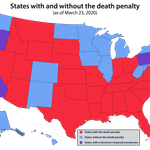
On March 23, 2020, Colorado became the 22nd U.S. state to abolish the death penalty, as Governor Jared Polis (pictured) signed legislation repealing the state’s capital punishment statute and commuted the sentences of the state’s three death-row prisoners to life without possibility of parole. The state was the tenth to legislatively or judicially abolish capital punishment in the past fifteen years.
Colorado’s abolition of capital punishment exemplifies a nationwide trend away from the death penalty, which has been particularly striking in the West. Governors in four Western states – California, Colorado, Oregon, and Washington – halted executions in recent years. Two of those states – Colorado and Washington – went on to judicially or legislatively abolish the death penalty, and Oregon restricted the circumstances in which it can be used. No state west of Texas has carried out an execution in the past five years and fewer new death sentences were imposed in those states last year than in any year since California brought back its death penalty in the late 1970s. Public support for the death penalty throughout the U.S. is near a generational low, dropping from a high of 80% in 1994 to 56% in 2019. A majority of Americans (60%) in last year’s death-penalty poll by the Gallup organization said they prefer life without parole to the death penalty as the appropriate punishment for murder.
The repeal bill did not address the fates of the state’s three death-row prisoners: Nathan Dunlap, Sir Mario Owens, and Robert Ray. In a statement released in conjunction with the executive orders commuting their sentences, Governor Polis said his acts of clemency were not based on humanitarian concerns, but “to reflect what is now Colorado law.” The commutations, he said, “are consistent with the abolition of the death penalty in the State of Colorado, and consistent with the recognition that the death penalty cannot be, and never has been, administered equitably in the State of Colorado.”


Colorado’s new law applies to cases criminally charged on or after July 1, 2020, creating the possibility that new death sentences could still be imposed in pending capital cases in Adams and El Paso counties. However, Colorado juries have not imposed any death sentences in a decade and the state’s last execution was more than 20 years ago, in 1997. Colorado juries have refused to impose death sentences even in high-profile cases. In 2015, juries imposed life without parole for Dexter Lewis, who was convicted of killing five people in a Denver bar, and James Holmes, who was convicted of killing 12 and injuring dozens more in a mass shooting at an Aurora movie theater. In 2013, then-Governor John Hickenlooper imposed a moratorium on executions, calling the state’s death penalty system flawed and inequitable.
Colorado’s repeal bill benefitted from bipartisan legislative sponsorship in the Senate and a “blue wave” in the 2018 mid-term elections that gave Democrats a supermajority in the House. “I just came to the conclusion I didn’t think the state of Colorado should have the power over life and death in any circumstance,” said Sen. Jack Tate, a Republican sponsor of the bill. Democratic Rep. Adrienne Benavidez, who sponsored the bill in the House, said, “It’s important that we end that I think it has been a very discriminatory practice, not just towards people of color, but people within geographic areas within the state.” The bill passed the Senate by a 19 – 13 vote on January 30 and the House by a 38 – 27 vote on February 26.
Andrew Kenney, Colorado Death Penalty Abolished, Polis Commutes Sentences Of Death Row Inmates, Colorado Public Radio, March 23, 2020; Saja Hindi, Colorado abolishes death penalty; governor commutes sentences of 3 on death row, The Denver Post, March 23, 2020; David K. Li, Colorado abolishes the death penalty, NBC News, March 23, 2020.
Read Governor Polis’ announcement of the bill signing and commutations.
Read DPIC’s Statement on Colorado’s Abolition of Capital Punishment.



